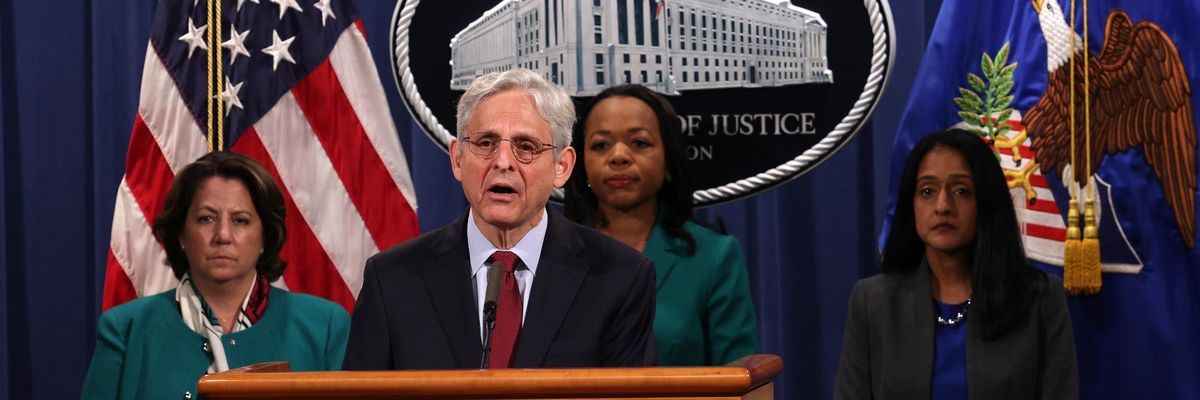U.S. Attorney General Merrick Garland on Friday vowed "to ensure that we protect every qualified American seeking to participate in our democracy" at a press conference announcing a Department of Justice lawsuit against Georgia over the state's new voting law, which the Biden administration and civil rights advocates allege is meant to disenfranchise Black voters.
"Our careful assessment of facts and law demonstrates that Georgia's law violates Section 2 of the Voting Rights Act."
--Kristen Clarke, DOJ
"The rights of all eligible citizens to vote are the central pillars of our democracy. They are the rights from which all other rights ultimately flow," Garland said, lamenting "the dramatic rise in state legislative actions that will make it harder for millions of citizens to cast a vote that counts."
Earlier this year, the GOP-controlled Georgia state Legislature passed, and Republican Gov. Brian Kemp signed into law, Senate Bill 202, which critics called "a vicious attack on voting rights."
The law imposed new identification requirements for voters casting ballots by mail, limited the use of absentee ballot drop-boxes, introduced new challenges to voting eligibility, prohibited mobile voting vans, barred local governments from receiving private sector grants, and even outlawed handing out food and water to people waiting in what can be notoriously long lines to vote.
"Our complaint alleges that recent changes to Georgia's election laws were enacted with the purpose of denying or abridging the right of Black Georgians to vote on account of their race or color, in violation of Section 2 of the Voting Rights Act," Garland said Friday.
"Our progress on protecting voting rights, especially for Black Americans and people of color, has never been steady," he continued. "Moments of voting rights expansion have often been met with counter-measures to curb the franchise."
"Where we see violations of federal law, we will act," Garland said, calling the new lawsuit "the first of many steps to ensure that all eligible voters can cast a vote."
The attorney general noted that the U.S. Supreme Court significantly weakened the Civil Rights Act in Shelby County v. Holder, a 2013 ruling that effectively neutralized Section 5 of the Voting Rights Act.
According to the Brennan Center for Justice, Section 5 requires "certain jurisdictions with a history of discrimination to submit any proposed changes in voting procedures to the U.S. Department of Justice or a federal district court in [Washington,] D.C. before it goes into effect to ensure the change would not harm minority voters."
Garland urged Congress "to act to provide the [Justice] Department with the authority it needs to protect the voting rights of every American."
"If Georgia had still been covered by Section 5, it is likely that S.B. 202 would never have taken effect," he asserted. "We urge Congress to restore this valuable tool."
Assistant Attorney General for Civil Rights Kristen Clarke spoke after Garland on Friday, declaring that the Justice Department "will spare no effort to protect voting rights in this country."
Clarke alleged that Georgia state lawmakers "violated normal practice and procedure" while passing S.B. 202, which she said was "adopted with the intent to deny or abridge Black citizens equal access" to the voting process and push African-American voters to in-person voting, "where they are more likely than white voters to face long lines."
"Our careful assessment of facts and law demonstrates that Georgia's law violates Section 2 of the Voting Rights Act," she concluded.
Civil and voting rights advocates applauded the lawsuit.
"The Justice Department now has leaders with tremendous experience in civil rights enforcement, and we are very pleased to have them enter the fray the side of our democracy," said Andrea Young, executive director of the ACLU of Georgia, in a statement.
Cliff Albright and LaTosha Brown, co-founders of Black Voters Matter, said in a statement that "we've always known that these voter restriction bills were unconstitutional at their core."
"Today's announcement is not only an affirmation of the work we do each and every day to protect voting rights; it's a stern warning to other states," they said. "Any state or local governments pursuing voter suppression legislation must be prepared to defend Jim Crow in court, because we simply will not let this go."
"As we make our way toward Washington on our Freedom Ride for Voting Rights tour, we are urging the Biden-Harris administration and members of Congress to continue to stand up for voters and protect our voting power through the passage of the For the People Act and the John Lewis Voting Rights Advancement Act," Albright and Brown asserted. "We need to dismantle all barriers that prevent free and fair access to the ballot box. The fight continues."
The DOJ's move came days after U.S. Senate Republicans blocked debate on the For the People Act--a sweeping pro-democracy bill that would strengthen and expand voting rights and thwart GOP voter suppression efforts--furthering Democratic lawmakers' and rights activists' call for an end to the filibuster.
